Dickinson Goldsworthy Lowes
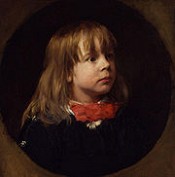
Goldsworthy Lowes Dickinson (August 6, 1862 - August 3, 1932), was a British historian and political activist. He led most of his life at Cambridge, where he wrote a dissertation on neoplatonism before becoming a fellow. He was closely associated with the Bloomsbury Group. A noted pacifist, Dickinson protested against Britain's involvement in World War I. His essay on the League of Nations Covenant within the Treaty of Versailles (The Future of the Covenant, London: League of Nations Union, 1920) helped to shape public opinion towards the League. Dickinson was born in London to Margaret Ellen Williams Dickinson, daughter of William Smith Williams who was literary advisor to Smith, Elder & Company and had discovered Charlotte Brontë. His father was Lowes Cato Dickinson (1819-1908), a portrait painter. When the boy was about one year old his family moved to The Spring Cottage in Hanwell, then a country village. The family also included his brother, Arthur, three years older, an older sister, May, and two younger sisters, Hester and Janet.[1] His schooling included attendance at a day school in Somerset Street, Portman Square, when he was 10 or 11. At about age 12 he was sent to Beomonds boarding school in Chertsey. His teenage years from 14 to 19 were spent at Charterhouse School in Godalming, where his brother, Arthur, preceded him. He was unhappy at the school, although he enjoyed seeing plays put on by visiting actors, and he played violin in the school orchestra. While he was at Charterhouse, his family moved from Hanwell to a house behind All Souls Church in Langham Place.[1] In 1881 he went to King's College, Cambridge as an exhibitioner (scholarship student), where his brother, Arthur, had again preceded him. Near the end of his first year he received a telegram informing him that his mother had died from asthma. During his college years, his tutor, Oscar Browning, was a strong influence, and Dickinson became a close friend of fellow King's College student C.R. Ashbee. Dickinson won the chancellor's English medal in 1884 for a poem on Savonarola, and in graduating that summer he was awarded a first class Classical Tripos.[2][1] After travelling in the Netherlands and Germany, he returned to Cambridge late that year and was elected to the Cambridge Conversazione Society, better known as the Society of Apostles. In a year or two he was part of the circle that included Roger Fry, J. M. E. McTaggart, and Nathaniel Wedd.[1] In the summer of 1885 he worked at a co-operative farm, Craig Farm at Tilford near Farnham in Surrey. The farm had been started by Harold Cox as an experiment in engaging in the simple living. Dickinson was proud of his hoeing, digging, and ploughing. That autumn, and continuing to the spring of 1886, Dickinson joined the University Extension Scheme to give public lectures that covered Carlyle, Emerson, Browning, and Tennyson. He toured the country, living for a term at Mansfield and for a second term at Chester and Southport. He spent a brief time in Wales afterwards.[1] With financial help from his father, Dickinson then began studies for a medical degree, beginning in October 1886 at Cambridge. Although he became dissatisfied with his studies and nearly decided to drop out, he persevered and passed his M.B. examinations in 1887 and 1888. Yet he finally decided he wasn't interested in a career in medicine.[1] In March 1887 a dissertation on Plotinus helped his election to a fellowship at King's College. During Roger Fry's last year at Cambridge (1887-1888), Dickinson, a homosexual,[3] fell in love with him. After an initially intense relationship (that according to Dickinson's biography didn't include sex with Fry, a heterosexual), the two maintained a long friendship. Through Fry, Dickinson soon met Jack McTaggart and Ferdinand Schiller.[1] Dickinson then settled down at Cambridge, although he again lectured through the University Extension Scheme, travelling to Newcastle, Leicester, and Norwich. His fellowship at King's College (as an historian) was permanently renewed in 1896. That year his book, The Greek View of Life was published. He later wrote a number of dialogues in the Socratic tradition.[1] But one must not think that Dickinson lived the detached life of a stereotypical Cambridge professor. When G. K. Chesterton chose contemporary thinkers he disagreed with for his 1905 book, Heretics, the focus of Chapter 12 was "Paganism and Mr. Lowes Dickinson." There he notes: Chesterton goes on to suggest that Christianity has so altered our civilization, that we can never return to Paganism: Finally, Chesterton closes with a suggestion: Dickinson was a lecturer in history from 1886 to his retirement in 1920, and the college librarian from 1893 to 1896. Dickinson helped establish the Economics and Politics Tripos and taught political science within the University. For 15 years he also lectured at the London School of Economics.[4] In 1897 he made his first trip to Greece, travelling with Nathaniel Wedd, Robin Mayor, and A. M. Daniel.[1] He joined the Society of Psychical Research in 1890, and served on its Council from 1904 to 1920.[1] In 1903 he helped to found the Independent Review. Edward Jenks was editor, and members of its editorial board included Dickinson, F. W. Hirst, C. F. G. Masterman, G. M. Trevelyan, and Nathaniel Wedd. Fry designed the front cover. Over the years Dickinson contributed a number of articles to it, some later reprinted in Religion: A Criticism and a Forecast, (1905) and Religion and Immortality, (1911).[1] Within a fortnight of the start of World War I, Dickinson had drafted schemes for a "League of Nations" and, together with Lord Dickinson and Lord Bryce, he planned the ideas behind of the League of Nations and played a leading role in the founding of the group of internationalist pacifists known as the Bryce Group. The organisation eventually became the nucleus of the League of Nations Union. Dickinson promoted his ideas with a large number of books and pamphlets[1], including his book The International Anarchy.[4] Dickinson also attended a pacifist conference in The Hague in 1915. In 1916 Dickinson started a lecture tour in the United States promoting the idea of a League of Nations.[1] In 1929 the Talks Department of the BBC invited him to give the first and last lectures in a series called "Points of View". He went on to give several series of BBC talks on various topics including Goethe and Plato.[1] After a prostate operation in 1932, Dickinson appeared to be recovering, but died on 3 August. Memorial services were held in King's College Chapel, and in London.[1] E.M. Forster, by then a good friend who had been influenced by Dickinson's books, became his literary executor. Dickinson's sisters then asked Forster to write the dead man's biography, which was published as Goldsworthy Lowes Dickinson in 1934. Forster has been criticised for refraining from publishing details of Dickinson's sexual proclivities, including his foot fetishism and unrequited love for young men.[5] Posthumous:
do you like this author?
What readers are saying
What do you think? Write your own comment on this book!
write a commentWhat readers are saying
What do you think? Write your own comment on this author!
write a commentBook list
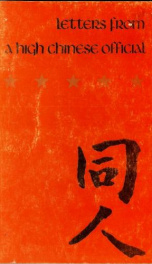
letters from a chinese official being an eastern view of western civilization
Series:
Unknown
Year:
Unknown
Raiting:
5/5
This volume is produced from digital images created through the University of Michigan University Library's preservation reformatting program. The Library seeks to preserve the intellectual content of items in a manner that facilitates and promotes a variety of uses. The digital reformatting process results in an electronic version of the text that can both be accessed online and used to create new print copies. This book and thousands of others can be found in the digital collections of the University of Michigan Library. The University Library also understands and values the utility of print, and makes reprints available through its Scholarly Publishing Office. --This text refers to the Paperback edition.
Show more
add to favoritesadd In favorites
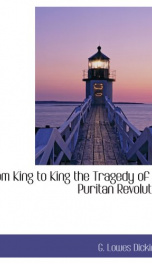
from king to king
Series:
Unknown
Year:
Unknown
Raiting:
4/5
Many of the earliest books, particularly those dating back to the 1900s and before, are now extremely scarce and increasingly expensive. We are republishing these classic works in affordable, high quality, modern editions, using the original text and artwork. --This text refers to an alternate Paperback edition.
Show more
add to favoritesadd In favorites
Book list

letters from a chinese official being an eastern view of western civilization
Series:
Unknown
Year:
Unknown
Raiting:
5/5
This volume is produced from digital images created through the University of Michigan University Library's preservation reformatting program. The Library seeks to preserve the intellectual content of items in a manner that facilitates and promotes a variety of uses. The digital reformatting process results in an electronic version of the text that can both be accessed online and used to create new print copies. This book and thousands of others can be found in the digital collections of the University of Michigan Library. The University Library also understands and values the utility of print, and makes reprints available through its Scholarly Publishing Office. --This text refers to the Paperback edition.
Show more
add to favoritesadd In favorites

from king to king
Series:
Unknown
Year:
Unknown
Raiting:
4/5
Many of the earliest books, particularly those dating back to the 1900s and before, are now extremely scarce and increasingly expensive. We are republishing these classic works in affordable, high quality, modern editions, using the original text and artwork. --This text refers to an alternate Paperback edition.
Show more
add to favoritesadd In favorites

an essay on the civilisations of india china japan
Series:
Unknown
Year:
Unknown
Raiting:
4.5/5
Show more
add to favoritesadd In favorites
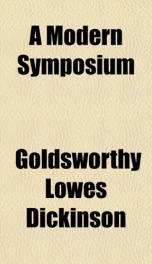
A Modern Symposium
Series:
Unknown
Year:
Unknown
Raiting:
3/5
Purchase of this book includes free trial access to www.million-books.com where you can read more than a million books for free. This is an OCR edition with typos. Excerpt from book: those whom we appear to control. We are permitted, like children, to lay our hands upon the reins; but it is a dark and unknown genius who drives. We are his creatures; and it is his ends, not ours, that are furthered by our contests, our efforts, our ideals. In the arena Remenham and I must play (' our part, combat bravely, and be ready to die when ithe crowd turn down their thumbs. But here in a 1'moment of withdrawal, I at least cannot fail to recognize behind the issues that divide us the tie of a common destiny. We shall pass and a new generation will succeed us; a generation to whom our ideals will be irrevelant, our catch-words empty, our controversies unintelligible. Hi motus animorum atque haec certamina tanta Pvlveris exigui jactu compressa- quiescunt.' "The dust of oblivion will bury our debates. Something we shall have achieved, but not what we intended. My dream may, perhaps, be furthered by Remenham, and his by me, or, it may be, neither his nor mine by either. The Providence whose purposes he so readily divines is dark to me. And perhaps, for that reason, I am able to regard him with more charity than he has always been willing, I suspect, to extend to me. This, at any rate, is the moment of truce. The great arena is empty, the silent benches vanish into the night. Under the glimmer of the moon figures more than mortal haunt the scene of our ephemeral contests. It is they which stand behind us and deal the blows which seem to be ours. When we are laid in the dust they will animate other combatants; when our names are forgotten they will blazon others in perishable gold. Why, then, should we strive and cry, even now in the twilight hour? The same sky encompasses us, the same stars are above us. What are my opinions, what are Remenham's? Froth on the surf...
Show more
add to favoritesadd In favorites
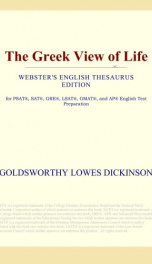
The Greek View of Life
Series:
Unknown
Year:
Unknown
Raiting:
4/5
Created for tutors, teachers, and students looking for improving performance on standardized tests, Webster's paperbacks take advantage of the fact that classics are frequently assigned readings in English courses. By using a running thesaurus at the bottom of each page, this edition of ‘The Greek View of Life’ by Goldsworthy Lowes Dickinson was edited for students who actively enrich their vocabularies in anticipation of taking PSAT, SAT, AP (Advanced Placement), GRE, LSAT, GMAT or similar tests. PSAT is a registered trademark of the College Entrance Examination Board and the National Merit Scholarship Corporation neither of which sponsors or approves this book; SAT is a registered trademark of the College Board which neither sponsors nor recommends this book; GRE, AP and Advanced Placement are registered trademarks of the Educational Testing Service which neither sponsors nor endorses this book, GMAT is a registered trademark of the Graduate Management Admissions Council which is neither affiliated with this book nor endorses this book, LSAT is a registered trademark of the Law School Admissions Council which neither sponsors nor endorses this edition.
Show more
add to favoritesadd In favorites
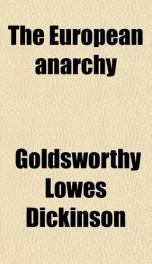
The European Anarchy
Series:
Unknown
Year:
Unknown
Raiting:
1/5
Purchase of this book includes free trial access to www.million-books.com where you can read more than a million books for free. This is an OCR edition with typos. Excerpt from book: who have invented and pursued the nationalistic and chauvinistic policy which menaces to-day the peace of Europe, and of which we have noted the renaissance. It is a danger for Europe and for Belgium. I see in it the greatest peril, which menaces the peace of Europe to-day; not that I have the right to suppose that the Government of the Republic is disposed deliberately to trouble the peace, rather I believe the contrary; but the attitude that the Barthou Cabinet has taken up is, in my judgment, the determining cause of an excess of militaristic tendencies in Germany. It is clear from these quotations, and it is for this reason alone that I give them, that France, supported by the other members of the Triple Entente, could appear, and did appear, as much a menace to Germany as Germany appeared a menace to France; that in France, as in other countries, there was jingoism as well as pacifism; and that the inability of French public opinion to acquiesce in the loss of Alsace-Lorraine was an active factor in the unrest of Europe. Once more I state these facts, I do not criticize them. They are essential to the comprehension of the international situation./ 5. Russia We have spoken so far of the West. But the Entente between France and Russia, dating from 1894, brought the latter into direct contact with Eastern policy. The motives and even the terms of the Dual Alliance are imperfectly known. Considerations of high finance are supposed to have been an important factor in it. But the main intention, no doubt, was to strengthen both Powers in the case of a possible conflict with Germany. The chances of war between Germany and France were thus definitely increased, for now there could hardly be an Eastern war without a Western one. Germany must therefore regard herself as compel...
Show more
add to favoritesadd In favorites
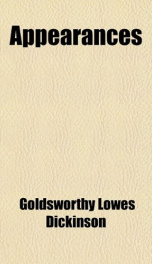
Appearances
Series:
Unknown
Year:
Unknown
Raiting:
4/5
Purchase of this book includes free trial access to www.million-books.com where you can read more than a million books for free. This is an OCR edition with typos. Excerpt from book: n AJANTA A Dusty road running through an avenue across the great plateau of the Deccan; scanty crops of maize and cotton; here and there low hills, their reddish soil sparsely clothed with trees; to the north, a receding line of mountains; elsewhere infinite space and blazing light. Our "tonga," its pair of wheels and its white awning rolling and jolting behind two good horses, passes long lines of bullock-carts. Indians, walking beside them with their inimitable gait, make exquisite gestures of abjection to the clumsy white Sahibs huddled uncomfortably on the back seat. Their robes of vivid colour, always harmoniously blent, leave bare the slender brown legs and often the breast and back. Children stark naked ride on their mothers' hips or their fathers' shoulders. Now and again the oxen are unyoked at a dribble of water, and a party rests and eats in the shade. Otherwise it is one long march with bare feet over the burning soil. We are approaching a market. The mud walls of a village appear. And outside, by a stream shrunk now into muddy pools, shimmers and wimmers a many- coloured crowd, buzzing among their wagons andawnings and improvised stalls. We ford the shallow stream, where women are washing clothes, cleaning their teeth, and drinking from the same water, and pass among the bags of corn, the sugar-cane, and sweetmeats, saluted gravely but unsolicited. Then on again for hours, the road now solitary, till as day closes we reach Fardapur. A cluster of mud-walled compounds and beehive huts lies about a fortified enclosure, where the children sprawl and scream, and a Brahmin intones to silent auditors. Outside they are drawing water from the puddles of the stream. And gradually over the low hills and the stretches of yellow grass the after-glow spreads a transfigu...
Show more
add to favoritesadd In favorites
What readers are saying
What do you think? Write your own comment on this author!
write a commentif you like Dickinson Goldsworthy Lowes try:
readers also enjoyed
What readers are saying
What do you think? Write your own comment on this author!
write a commentGenre
if you like Dickinson Goldsworthy Lowes try:
readers also enjoyed
Do you want to read a book that interests you? It’s EASY!
Create an account and send a request for reading to other users on the Webpage of the book!

